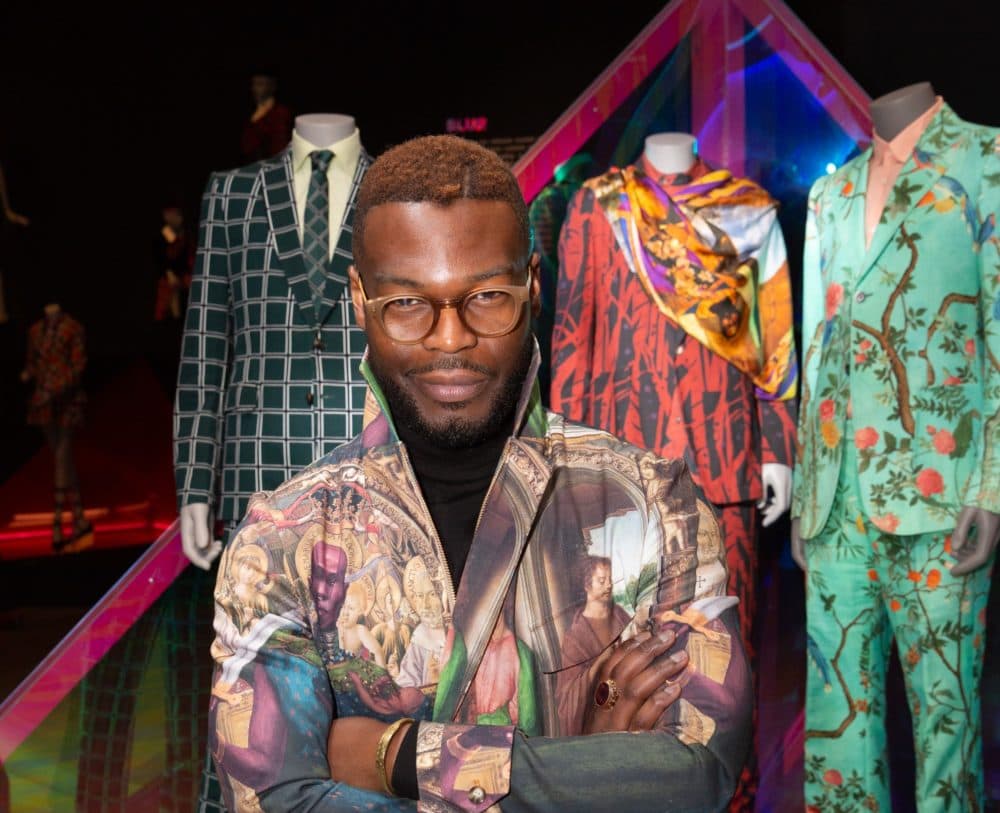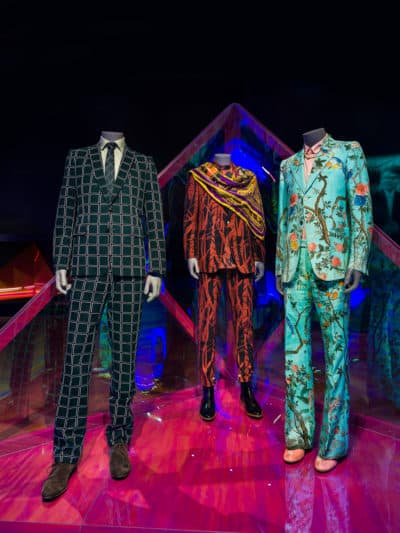Advertisement
Designer Walé Oyéjidé Discusses Experiments With The Suit And Gender Bending Fashion

When most people think about a suit, they probably think about someone in a position of authority. And, when people think about who typically wears suits, the image is mostly men — businessmen, bankers and lawyers.
But, for almost as long as suits have symbolized masculinity and power, people have been experimenting with the suit and subverting its meanings.
The suit is just one of the fashion trends explored in the Gender Bending Fashion Exhibition at the Museum of Fine Arts in Boston. The exhibit is the first-ever large-scale exhibition of non-binary fashion. It features designs from Christian Siriano, Yves Saint Laurent, and Alessandro Michele, of Gucci fame.
It also includes work — a bold-patterned suit — from Philadelphia-based fashion designer Walé Oyéjidé, who founded the fashion brand Ikiré Jones.
Oyéjidé speaks at the MFA about the show and his work at 7 p.m. Wednesday.
Guest
Walé Oyéjidé, founder and creative director for Ikiré Jones, which tweets @IkireJones.
Interview Highlights
On the mission of his fashion brand:
"Ikiré Jones is a fashion brand that uses inspirations from all over the globe, primarily West Africa — which is where I'm from — and classical European art. [We] use fashion as a vehicle for storytelling about marginalized populations, immigrants, refugees, migrants ... all through the veil of beautiful clothing."
On how he thinks fashion affects social change:
"Fashion is something that is ubiquitous. We all wear clothing. We may think we 'don't care' about fashion, but each of us has something we put on because it gives us confidence, because it makes us feel good, or simply because we know we make a certain statement to the world.
Sadly, fashion has often been used as a divider. As a sign of exclusivity, a sign of who does and does not belong to things. With that same strength, I flipped the narrative and use fashion as a way to bring us together by showing the many things we have to contribute to conversation and showing how we all have places in the boardroom, places within the museum, places on the gallery wall. We can all create excellence and we all have beauty within us."

On his 'Wakanda With Love' scarf appearing in the 2018 film Black Panther:
"Black Panther was fantastic, and I didn't have to compromise what I've been saying and what I will continue to say — that we have merit, we have worth, and we are just as beautiful as anyone else. It was nice to kind of get that co-sign from the world of Disney and to be in an era where the world is receptive to different perspectives."
On why he considers his brand gender bending:
"My clothing is intended to express beauty, and it's not made for any particular identification. Those who are drawn to it, like my art, are those who it's for. We just make suits and if you've got two legs, you can put them on. Doesn't matter what else you have."
On the Vines II suit, from the collection 'Born Between the Borders,' now on display at the MFA:
"It's inspired by the forests, and it's got what looks to be foliage. Oftentimes, when we think of suits that men wear, particularly in the U.S., you think of a classic banker pinstripe suit or a solid grey or navy. We've been kind of constricted into these very limited ideas of what can be elegant, what can be beautiful. I think women tend to feel a bit more freedom by wearing prints, symbols, colors. My work extols the idea that there's no reason one cannot be bold and still be taken seriously at the same time."
This segment aired on April 24, 2019.

